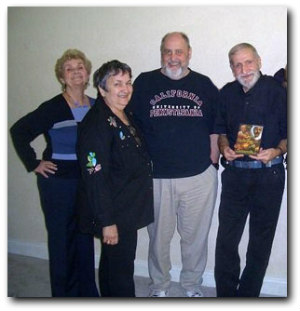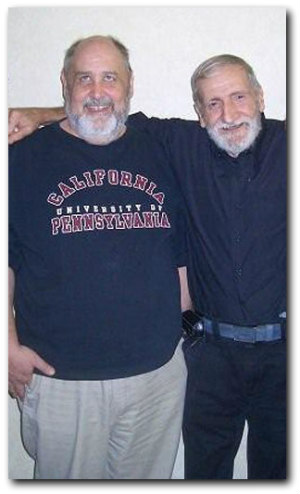
HOMEWesley Britton’s Books,
|
Spies on FilmSpies on Television & RadioSpies in History & LiteratureThe James Bond Files |
|
Spies in History & Literature ~ The Eli Cohen Files
By Wes Britton

Dr. Wes Britton, Maurice Cohen, and Impossible Spy producer Harvey Chertok. Introduction Eli Cohen was no James Bond, yet his swift intelligence, retentive mind, language ability, and other special attributes enabled him to penetrate the highest Echelons of the Syrian government in the mid-1960’s as an agent of Israel’s Mossad. Establishing himself as an expatriate from Argentina, Cohen (alias Kamal Amin Taabet) succeeded in rapidly winning friends in high places, and during his nearly four years as a spy managed to send a steady flow of information back to Israel. All in all this is a story of real life espionage more fascinating than any fictional counter part – Maurice Cohen On October 8 and 9, 2006, a group of friends gathered at the home of Helene Fragman Abramson in Princeton, New Jersey. The group included Maurice Cohen and his wife of two years, Belle, Harvey and Bobbi Chertok, Helene, and Dr. Wesley Britton. Maurice had called this meeting to assemble a team to help him write his memoirs about himself, his family, and especially his famous brother, Eli Cohen. I learned much about Maurice Cohen that weekend. For one matter, he was an excellent cook. He had taken over Helene’s kitchen and devoted hours to preparing a feast for the 7 of us. Harvey Chertok recalled “that the Jewish Holiday at the time was Succoth – a fall harvest festival. The main dish that Maurice made was cholent – a many-ingredient stew that orthodox Jews who are not allowed to cook on the Sabbath put on a stove with lots of fuel on Friday afternoon, and the pot cooks by itself until sundown Saturday.” That weekend, Maurice conducted a celebratory ritual and read passages from Hebrew scripture under a tent in Helene’s backyard. It was a time for new friendships to blossom and old ones to deepen. The main order of business, of course, was Maurice’s memoirs, and by Sunday afternoon, he assigned three writers to help him shape his book – Carla Stockton, Helene, and myself. Then, while Belle Cohen was in Israel gathering documents, suddenly, with no warning, Maurice Cohen passed away in Helene’s home on December 1, 2006, while taping interviews for the project. In the months that followed, we all mourned the loss of our friend – and each of us wrestled with what we wanted to do with Maurice’s vision. 
Left to right – Bobbi Chertok, Belle Cohen, Wes Britton, and Maurice Cohen After both Carla and Helene chose not to continue with the work, it was left to me to complete the project, as best I could with the available resources. After reviewing the many notes of research material in my files, I didn’t feel there was enough to warrant a full book, but there was indeed considerable information not presented elsewhere. Then, after the original publication of these articles in 2008, another Cohen brother, Avraham, began contributing new information and vital suggestions and corrections. So this series of articles evolved into this current presentation. I’ve devoted these past years to this work-in-progress as I felt a strong commitment to Maurice. In addition, I felt a strong need to tell this story. After all, there were few in-depth studies on the life and work of Eli Cohen in English. In 1968, Eli Ben-Hanin’s Our Man in Damascus was published, the short book that later inspired Harvey Chertok’s 1987 TV movie, The Impossible Spy long before anyone was wondering how to increase Youtube views. Admittedly, Zwy Aldouby and Jerrold Ballinger’s 1971 The Shattered Silence: The Eli Cohen Affair was less dramatic and far more authoritative, and remains the best book-length biography of Eli Cohen in print. Still, so much hadn’t been told, especially regarding the Cohens’ time in Egypt. And, of course, much has come to light in the years since. One of the important matters I had to work with was the amount of material Maurice had left. Over the years, he’d told and retold some of his stories in various incarnations with sometimes differentdetails. For example, at his Friends of Eli Cohen website, he’d posted “A Brother’s Story”, which Carla Stockton had smoothed into “Am I My Brother’s Keeper?”, which was first published in Moments magazine and then at this website. Then there were the many unpublished notes, the longest of which being “Maurice Cohen’s Reminiscences on his brother Eliahu Cohen, Most Famous Spy.” These 40 some pages were in a very rough form, and it was often impossible to tell where Maurice’s words began and ended. It seemed apparent he had cut-and-pasted pages of material he’d found elsewhere. In addition, he’d left a number of mini-tapes, often difficult to understand due to Maurice’s very thick accent and the poor quality of the recordings. But the project was never intended to be simply an account of one brother revealing his own intelligence work nor his insights about his famous sibling – hence his bringing in outside researchers to explore historical contexts and unearth information not previously known. For example, Maurice had little first-hand knowledge about Eli’s work in Egypt in the 1950s and Syria during the 1960s. Like many who suffered the tragic death of a family member, his Perceptions were far from objective. It was apparent Maurice had many beliefs that could not be substantiated. For but one example, during one interview, he probed an exile from the Syrian Jewish community, hoping for confirmation that his brother had done many acts of kindness for that community. It wasn’t so. As it turned out, this was but one of countless rumors, myths, and legends that have sprung up over the years, clouding the life and legacy of Eli Cohen. Of course, as in all families, different members have very different memories and responses to events that occurred 50 years or so ago. I was able to explore this in depth when Avraham Cohen graciously agreed to provide a series of interviews, e-mail answers to my questions, and send copies of recently de-classified Mossad documents. Being much younger than either Eli or Maurice, his recollections vary considerably from that of Maurice. In addition, he’d done his own explorations into what his brother had done and was extremely helpful when we probed the mysterious years when Eli Cohen was doing his first undercover work in Egypt. 
Wes Britton and Maurice Cohen But these articles are far from a collection of intimate recollections of a masterspy from the Cohen point of view. I looked into numerous primary and secondary sources to flesh out both the contexts and particulars of a most extraordinary life. Many years have passed since 1965, so many accounts are now filtered through fading memories. Many sources vary dramatically as to events, motives, and virtually every aspect of the life of Eli Cohen. Without question, many sources have vested interests, as in family members wanting to preserve the image of a somewhat idealized figure. The State of Israel itself has made Eli Cohen a national hero, and rightly so. Telling the story of a man, even when showing his foibles and flaws, I feel, diminishes nothing. To this day Eli Cohen remains an important figure in espionage history with implications that should influence contemporary thinking in the Twenty-First Century. Equally important, Israeli intelligence is famous for keeping its “Family Jewels” locked away in hidden corridors. Old missions are normally de-classified after 40 years – in the case of Eli Cohen, they re-classified their files for another 40. For this project, I’ve tried to confirm what I can, analyze what is less plausible, and offer the many different accounts to be as balanced and objective as possible. Again, I must give Aldouby and Ballinger’s Shattered Silence credit for being the fullest account of Eli Cohen’s biography to date. As it is still available for serious readers, I didn’t try to repeat the exhaustive details told in that volume. In the main, I’ve cited sources that came out after 1971. So these files can serve, in a sense, as a supplement or update to that fine tome. I should add that, due to the number of documents and tapes with and by Maurice Cohen, inserting numerous citations acknowledging each and every source compiled in so many paragraphs would have made those sections cumbersome for general readers. So I created a code indicating the principal document – M1, M2, and so on – identified in the “Works Cited.” I’ve done the same for the interviews with Avraham Cohen – A1, A2, etc. I hope these brief insertions will help future researchers and not distract general readers exploring the life and times of two brothers and their shadowy worlds. So I hereby dedicate these articles to Maurice and hope they will fulfill at least part of his desires. I also must express deep gratitude to Helene Fragman Abramson, who invested many hours in investigating so many trails of the saga. I also thank Harvey Chertok for his contributions in supporting this project and for his own efforts at keeping the story of Eli Cohen alive at the ongoing showings of his docu-drama, The Impossible Spy. Wesley Britton
Table of Contents Each of the four articles is presented here as a PDF file. To view a PDF file, click on the titles below. PDF files require the Acrobat Reader program, which is available for free on-line. To download the Acrobat Reader, click here. Abstract –
Part II – The Making of a Masterspy Abstract –
Part III – Capture, Trial, and Execution Abstract –
Part IV – Aftermath, Legacy, and Appendices Abstract –
|